
- By Content Coms
- In Thinking, Useful Stuff
Content Coms analysis: A planet in crisis; greenhouse gas concentrations shatter records
The latest data shows C02 and other greenhouse gas levels rising, not falling. How can we arrest this spiralling path to disaster?
The news is out; atmospheric concentrations of carbon dioxide and other greenhouse gases once again reached new highs in 2018.
For anyone interested in or indeed working in the low carbon economy, and indeed for those outside it too, this is a pivotal moment.
Analysing the data behind the announcements, available here and here, reveals a fundamental disconnect. The solutions to the problem exist; they are simply being adopted far too slowly, if at all.
Why isn’t climate change policy saving the day?
This excellent UNEP infographic explains. Put simply; countries are not doing enough, even though we know about the challenge. Increasing numbers of countries and regions are adopting ambitious goals in line with the transformation needed, but the scale and pace is insufficient.
To date, 71 countries and 11 regions, accounting for about 15% of global GHG emissions in total, have long-term objectives to achieve net-zero emissions, differing in scope, timing and the degree to which they are legally binding. This leaves countries representing the remaining 85% of global GHG emissions still to make similar commitments.
“To say that we seem to be making little or no headway on halting global warming would indeed be appropriate at this moment,” comments Joanna Watchman, our Founder and CEO at Content Coms.
“What’s tragic is that when you go into the data behind the numbers, you can see that we already have the solutions; elements like renewables, energy efficiency and electric vehicles. In metric terms, they have the potential to manage the challenge.
“But we simply are not responding to the need for these solutions at the right pace. Given they also offer many green jobs and a way to transform our economy, the opportunity being missed is twofold, at a potentially terrible cost, financial and humanitarian.”
Hastening pivotal action
UNEP reveals more; the G20 (a group of 19 countries, plus the EU) account for 78% of all emissions. Theirs is the biggest opportunity to lead the world.
But tellingly, just two G20 members (United Kingdom, France) have passed legislation. Three G20 members (Germany, Italy, and the EU28) are currently in the process of passing legislation. Yet a shocking 15 G20 members still have no net-zero emission target legislation at all.
“We are all familiar with Trump’s reversals on climate,” comments Jo Watchman. “But what is often hidden behind complex news reports on climate meetings is how slowly, and how reluctantly if at all many countries commit.
“The solution requires daring pace and unequivocal action. Parliaments and political processes need to radically upchange their game.”
Why we must own the problem today: 1.5°C vs 2°C of warming
Crucially, the more we do to get measures in place has exponential impacts:
Sea-level rise will be a metre higher at 2°C than at 1.5°C. Insects, vital for pollination of crops and plants, are likely to lose half their habitat at 1.5°C but this becomes almost twice as likely at 2°C. At 1.5°C, over 70% of coral reefs will die, but at 2°C virtually all reefs will be lost.
The business and societal impacts of failing to act are vast. UNEP says climate change can still be limited to 1.5°C degrees. We must halve our emissions by 2030; this will take a 7.6 per cent cut in emissions every year from 2020.
The good news is that we have the technology and science to decarbonise our energy sources, transport systems and cities.
Potential emission reduction thanks to renewable energy electricity totals 12.1 gigatonnes by 2050. That’s equivalent to the annual output of nearly two and a half million coal power stations: more than are operating in the world today. Electrification of transport could reduce the sector’s CO2 emissions by a huge 72 per cent by 2050.
“I challenge any individual, or government, to read the facts above and fail to respond,” concludes Joanna. “Time is not our friend. Action is necessary now, globally and at radical pace.”
BREAKING: EU parliament declares climate emergency. [28/11/19]

